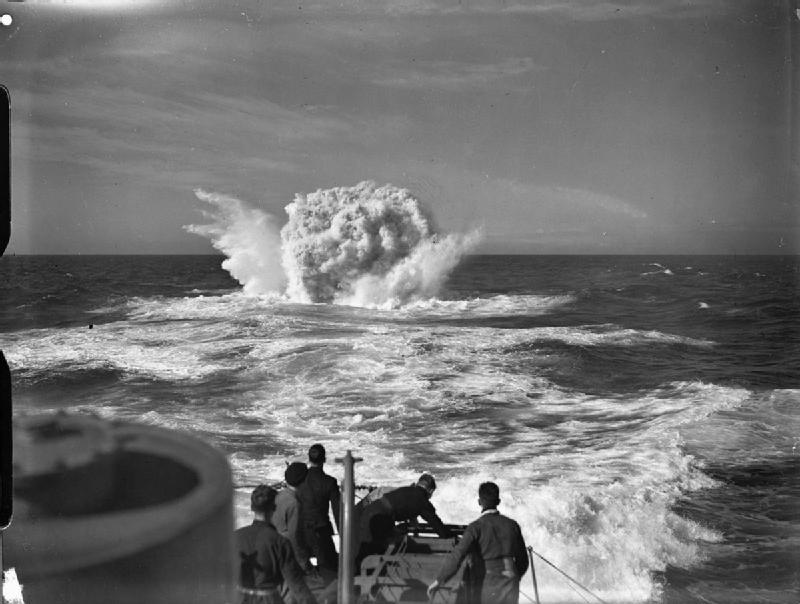
Allies watch the results of a depth charge on a U-Boat in May 1943, when Black May took place. It was one of the turning points of World War II. For more information, click here. Click to enlarge. Wikipedia.
By: Phil Kohn. Dedicated to the memory of his father, GM3 Walter Kohn, U.S. Navy Armed Guard, USNR, and all men and women who have answered the country’s call in time of need. Phil can be contacted at ww2remembered@yahoo.com.
In a speech to Nazi Party leaders in Berlin on May 7, 1943, Hitler says that U-boat warfare — the surest way, he declares, to “cut the arteries of the enemy” — will be stepped up. Even as der Führer speaks, however, the calamity of what comes to be known as “Black May” for the U-boat force is unfolding in the Atlantic. where major losses are being incurred. Advances in Allied techniques for convoy protection and anti-submarine warfare drastically reduce shipping losses and increase submarine “kills.” In May in the Atlantic alone, the Germans lose 18 U-boats to convoy battles and 14 to anti-submarine air patrols. In Tunisia, Tunis falls to the British First Army. The U.S. Army’s II Corps reaches Bizerte, 44 miles to the northwest, the same day.
In Washington, D.C., the Joint Chiefs of Staff on May 8 approve the strategic plan for the defeat of Japan, including the objective of that nation’s unconditional surrender. Thousands of Korean-Americans begin signing a petition to have their status converted from that of “enemy aliens” to “friendly aliens.” In December 1943 the petition will be granted, and their status changed. Retreating German and Italian troops in Tunisia attempt to make a stand at Cape Bon, a peninsula northeast of Tunis, but the British overwhelm them. The Germans quickly transfer all assets of the Luftwaffe in North Africa to Sicily.
The unconditional surrender of all Axis troops in Tunisia takes effect at 11 a.m. on May 9. The Soviets take over Sevastopol, on the southwest corner of Ukraine’s Crimean Peninsula, as Hitler finally changes his mind and orders German troops to evacuate the city. A German Junkers Ju-88 bomber equipped with a new air-intercept radar is flown secretly from Norway to Scotland by defectors. Analysis of this new radar and how it is used by Luftwaffe night fighters will prove vital to the Allies.
In China, the Chiangjiao Massacre is in its second day on May 10. For four days, from May 9 through May 12, soldiers of the Japanese China Expeditionary Army perpetrate a massacre in Chiangjiao, Hunan, China, aimed at the civilian population. Over 30,000 people are killed, and thousands of women are raped. In Berlin, Adolf Hitler signs an order extending his leadership of the Third Reich indefinitely. Der Führer also approves the launch of “Operation Citadel,” the offensive against the Kursk salient in Russia, for June 1943.
On May 11, 3,000 soldiers of the U.S. Army’s 7th Division — aided by Canadian reconnaissance and fighter-bomber support — land on Japanese-held Attu Island, in the Aleutians. The fighting is difficult, with U.S. forces withstanding multiple banzai charges. In Washington, despite strenuous Allied efforts to cloak the planned invasion of Sicily in secrecy, U.S. Secretary of the Navy Frank Knox almost blows the cover. Fortunately, his statement to a reporter, “Possession of Sicily would obviously be of advantage to the Allies,” is interpreted by the Nazis as a clumsy attempt at a deception. (As a result of a British misinformation effort, the Germans believe an Allied attack will target either Sardinia or Greece.)
The Anglo-American Trident Conference opens in Washington, D.C., on May 12 (and continues to May 25). Churchill secures Roosevelt’s agreement to American involvement in the Mediterranean beyond the planned invasion of Sicily. Churchill, in turn, agrees on a target date of May 1, 1944, for the invasion of France, which the U.S. considers of paramount importance. In North Africa, 130,000 German troops and 120,000 Italian soldiers are taken prisoner. Generals von Arnim and Messe — the German and Italian commanders, respectively, in North Africa — and 24 other Axis generals are also captured. This ends the existence of the once-mighty Afrika Korps.
The North African Campaign on May 13 officially comes to an end as the last German units lay down their arms. British Field Marshal Sir Harold Alexander sends word to Prime Minister Winston Churchill that “…the Tunis campaign is over. All enemy resistance has ceased.” In the almost three years of fighting in North Africa, nearly 480,000 Italian, German and Vichy French soldiers have been wounded or captured, with another 42,000 killed over the course of the campaign. Allied campaign losses number around 40,000 killed, and another 200,000 wounded, missing or captured.


